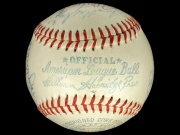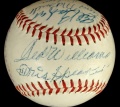Difference between revisions of "Baseball leather"
Jump to navigation
Jump to search
(username removed) |
(username removed) |
||
| Line 13: | Line 13: | ||
== Authority == | == Authority == | ||
| − | * | + | * Polymer Handbook, Sealants and Adhesives |
| − | * | + | * Random House, ''Webster's Encyclopedic Unabridged Dictionary of the English Language'', Grammercy Book, New York, 1997 |
* ''The American Heritage Dictionary'' or ''Encarta'', via Microsoft Bookshelf 98, Microsoft Corp., 1998 | * ''The American Heritage Dictionary'' or ''Encarta'', via Microsoft Bookshelf 98, Microsoft Corp., 1998 | ||
| − | * | + | * Website address 1 Comment: American Leather Chemists Association Glossary at www.leatherchemists.org |
[[Category:Materials database]] | [[Category:Materials database]] | ||
Revision as of 06:26, 24 July 2013
Description
The tanned leather used to cover the balls played with in the game of baseball. Prior to 1974, the cork center balls were wound with twine then covered with cowhide. Currently, alum-tanned horsehide is used for high-grade baseballs. Inexpensive balls may be covered in kip or sheepskin.
Additional Images
Authority
- Polymer Handbook, Sealants and Adhesives
- Random House, Webster's Encyclopedic Unabridged Dictionary of the English Language, Grammercy Book, New York, 1997
- The American Heritage Dictionary or Encarta, via Microsoft Bookshelf 98, Microsoft Corp., 1998
- Website address 1 Comment: American Leather Chemists Association Glossary at www.leatherchemists.org

